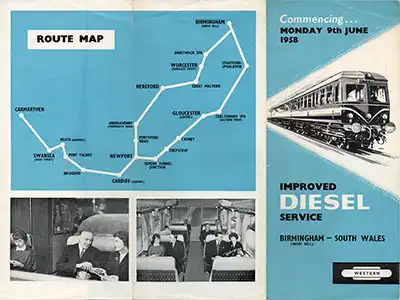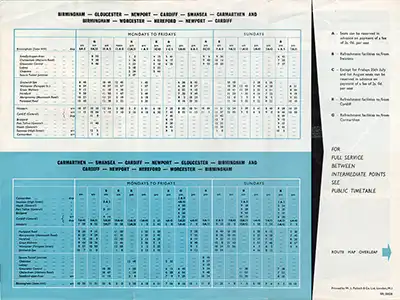Class 120 Swindon 3-car DMUs
Operations
Summary
The first batch were delivered to the Western Region with the first forty sets allocated to Cardiff Canton. By 1960 some of these had moved to Tyseley, and starting in 1964 some moved to Plymouth and Bristol. The remaining nine sets initially went to Bristol and some would also move onto other WR depots.
The seven sets of batch two (delivered late 1959/early 1960) were for the Scottish Region, used in the South Glasgow area and on Aberdeen-Inverness services before being concentrated on the latter from 1968. From 1962 till 1970 they operated a summer Glasgow - Oban service.

A batch three set on the 3.30pm Oxford - Birmingham Snow Hill at Acock's Green on 13 April 1961. Note that the formation contains two DMBC vehicles - they were not delivered as sets but all the DMBCs followed by the DMSLs. Michael Mensing.
The nine sets of batch three (delivered in 1961) were for the Western Region delivered initially to Tyseley (a WR depot at the time). After about a year the batch three sets would move to Plymouth.
In 1969 22 sets were transferred from the WR to Derby, to replace the less successful Cravens and BRCW units. They worked services to Matlock, Crewe, Lincoln, Birmingham and East Anglia.
In 1977 seven sets were transferred from Cardiff to Chester in exchange for Gloucester built Cross-Country sets, followed by a further four by 1980. All the Chester sets (ex-Central Wales 2-cars) and some at Derby had their trailers replaced by Met-Camm trailers, although other types were also used, such as BRCW 59206 and Class 107 59794.
In 1980 the Inverness sets moved, 4 to Cardiff (CF) and 3 to Ayr (AY). The following year the Ayr sets were transferred to Derby, and Newton Heath (NH) received 2 sets from the WR. They could be found on Manchester to Blackpool workings.
By 1983, only 2 sets remained at CF, with 31 at Derby, 17 at NH and 14 at Chester. At the beginning of 1986, Derby had 25, NH 16, Chester 4, Cardiff 2 and Ayr 7.
The last vehicles were withdrawn (from Haymarket) in 1989.
Their general reliability and good braking characteristics made them popular with drivers.
Early Days
Vehicles 50699 / 50701 were noted in the stock shed of Swindon Works on the 3rd November 1957. Noted in the Carriage Works on the 29th January 1958 were 50655-60/2/3, 59259-72, 50698/700/6/7/15/7. Some of the vehicles were coupled together on trial: 50698/50700/50707/50706, and 50658/59259/50657.[1]
The first sets delivered went into traffic on the Western Region on the 10th March 1958, replacing steam between Cardiff and Bristol. At first just one return working was involved, the 8.05am Cardiff to Bristol and 10.22am Bristol to Cardiff. Operated by two 3-car sets, it required two sets of catering staff to man both buffets.[2]

Two sets arriving into Birmingham Snow Hill as empty stock to form the 3.40pm to Cardiff General via Stratford-on-Avon, 22nd March 1958. Michael Mensing.
On the same day they also took over some steam workings between Birmingham Snow Hill and South Wales via Stratford-upon-Avon. Six-car sets operated the 4.47pm Cardiff to Birmingham, and 5.40pm Birmingham to Cardiff, and 8.15pm Cardiff to Birmingham. They also replaced the Swindon 79xxx series Inter-City sets on the 12.10pm and 8.15pm Cardiff to Birmingham and 12.25pm and 8.30pm Birmingham to Cardiff service. Sets noted on these new Cross-Country workings were from the range W50653-9 / W59257-62 / W50698-712.[3]
The Class 120s provided passenger facilities normally associated with the Inter-City trains, with more economic operation where the traffic was not large enough to justify the large formation.
On the 21st April they started between Oxford and Birmingham. The fastest left Oxford at 11:20 calling only at Banbury, Leamington and Warwick, arriving in Birmingham at 12:51. The 23 miles from Oxford to Banbury was run in 25 mins start to stop, and the 20 miles from Banbury to Leamington in 22 mins, both 'fastest-ever' timings. Other times were 08:40 Wolverhampton - Oxford (which ran on Mons - Fris, and also on Sats till the 10th May), and a 09:10 Birmingham to Oxford (this was possibly extended to being a 08:35 from Wolverhampton) on Sats from the 17th May. These were 3-car workings, but changed to 6-cars from the 17th May. There was also a through diesel train from Didcot to Wolverhampton (Mon - Sats), leaving at 07:04 and calling at most stations. This was a 6-car working, and the return left Wolverhampton at 16:40.
Noted in Swindon Works on the 4th May 1958 were 50665-7/96/7, 50715/8/9, 59273-8.
An unadvertised excursion on Sunday 1st June 1958 ran to Portsmouth Harbour, the first appearance of a diesel mechanical set there. The 3-car 120 ran from Hanwell via Basingstoke & Eastleigh.
As deliveries continued, it allowed further services to be taken over at the start of the summer 1958 timetable on the 9th June. They were introduced between Birmingham and Cardiff via Worcester and Hereford, and between Shrewsbury and Hereford. On both lines the number of trains were increased as was their average speed.
Between Birmingham and Cardiff the intermediate stops were generally Stourbridge Junction, Kidderminster, Droitwich, Worcester Foregate Street, Malvern Link, Great Malvern, Colwall, Ledbury, Hereford, Abergavenny, Pontypool Road and Newport. The average time was 3 1/4 hrs. The existing 08:00 from Birmingham was accelerated 15 min; the 09:45, which now started at 10:00, 16 min; the 12:00 was a new train in 3 hrs 10 min; the 13:00 also in 3 hrs 10 min, speeded up by 44 mins; the 17:40, which previously terminated at Malvern Wells, replaced the 17:00 with an acceleration of 40 mins and provided with a buffet car. The 20:00 was another new service, as was the 07:50 from Hereford to Cardiff, the latter with buffet car facilities. There was also similar improvements in the reverse direction, leaving Cardiff at 07:40, 08:35, 10:40, 12:42 and 18:40. There were also additional early morning and late evening trains from Hereford to Cardiff and Birmingham.


The summer 1958 timetable also saw the Birmingham - Cardiff 'Inter-City' service via Stratford and Gloucester slightly de-accelerated, due to additional stops being made, mainly at Statford and Cheltenham, and there were now no non-stop runs between Gloucester and Birmingham.
Between Shrewsbury and Hereford there was a complete transformation of the existing timetable. The passenger service was withdrawn from all intermediate stations and halts except Church Stretton, Craven Arms, Ludlow, Woofferton Junction, and Leominster, and the Class 120s covered the 51 miles in 75 mins inclusive off all these stops, except that at Woofferton, which was made by two services in each direction only, other stops being made by Ludlow - Tenbury branch trains.
Compared with the previous stopping trains from Shrewsbury at 06:25, 10:10, 13:15, 15:55, 18:55 and 20:22, averaging 110 mins on the run, there was trains at 07:00, 08:50, 10:40, 13:15, 15:05, 16:05, 16:50 and 18:40, also at 20:30 and 22:30 to Ludlow, besides the non-stop north to west expresses. The 07:00, 08:50, 13:15 and 16:50 had buffet cars, and the 07:00 and 16:50 were run through to Cardiff. Some of these trains made good connections at Hereford with the new Birmingham - Cardiff service, and also served as feeders to trains from the north to the west of England. Northbound, the new trains left Hereford at 07:05, 08:10, 10:45, 12:15, 15:00, 16:45, and 18:45. All but the 08:10, 12:15 and 16:45 had buffet cars, and the 08:10 through from Cardiff at 06:40.
On the 11th June 1958 vehicles 50717 / 59273 / 50666 and 50665 / 59275 / 50719 operated a Bristol Division permanent way outing to Totnes. The party then went by river to Dartmouth and were met at Kingswear by the train, which returned from Torquay at 18:30. It was also claimed that the trip was run for 'experimental purposes'.
The Birmingham - Hereford - Cardiff sets were noted as having an ordinary coach attached at the rear when required. An example was on the 18th June 1958, when the 17:40 from Snow Hill was formed of 50697 / 59276 / 50671 for Cardiff and 50657 / 59263 / 50712 with SK W5865W for Hereford.
Noted at Swindon on the 27th July 1958 were 50673/4 and 59280/1.
Around July 1958 120s were doing the odd 'filling-in' turn on Wellington - Lapworth stopping trains. The 84E shed plates which appeared on the leading buffer beam of several sets at this time began to be removed and trimmed top and bottom to fit on the underframes of the leading cars.
On the 30th August 1958 a day excursion from Birmingham to Paddington was worked by 50657 / 59263 / 50712 and 50719 / 59275 / 50665. The return from Paddington was at 20:25.
The winter timetable 1958 introduced on 15 September saw the diesel services between Birmingham, Worcester, Malvern, Hereford, Newport and Cardiff remain much the same, except all buffet facilities were withdrawn.[4] The buffet service would return in later timetables.
Vehicles noted at Swindon on the 16th November 1958 included 50683-7, 50734, 59291-5 along with three Class 119 sets.
London
A crisis arose in the London Operating District of the WR towards the end of 1959 when it was attempted to work the diesel timings with steam trains resulting in deplorable timekeeping. As a temporary measure sets were borrowed from Tyseley and Cardiff. In consequence many trains, advertised as diesels, between Swansea, Cardiff, Bristol and Birmingham were steam hauled. All but two Cardiff sets were returned within a fortnight when twenty Cathays suburban sets were sent to the London District.
Sets on loan included:
TYS 500 50650 / 59256 / 50700
CDF 507 50658 / 59261 / 50711
CDF 516 50609 / 59277 / 50718
CDF 528 50683 / 59294 / 50735
BL 516 50692 / 59300 / 50743
BL 517 50693 / 59299 / 50738
Reading
In May/June 1964 Reading would receive two sets (power cars 50688/95 and 50739/41) on loan from Bristol. They were returned a month later.

In preparation for the May 1968 timetable changes two batch three two-car Laira sets (51574/9 with 51583/8) were transferred to Reading to replace the two two-car GRC&W Cross-Country sets, allowing those to move to Inverness.
The image shows two-car set 503 (presumably 51588 + 51579) at Oxford in September 1968. Steve Davies Collection.
From November to December 1968 a Bristol set (50693/59299/50738) was on loan to Reading. Soon after in February 1969 another batch three set (51573/59296/51582) arrived on loan from Laira, meaning Reading now had three batch three sets. All three departed in May 1969, the on loan set moving to Bristol and the two two-cars to Cardiff Canton.
Reading would receive one more Class 120 vehicle in May 1982 when Cross-Country set 571 arrived from Cardiff, formed of two Class 119 power cars (51052/80) and Class 120 centre car 59282. The set was mainly used on Reading to Gatwick Airport services. W59282 would be replaced in L571 by W59434 (a Class 119) in May 1986 and withdrawn. It was reinstated in August 1986 and found in other sets such as Class 117 L426 and Class 119 L592 before being withdrawn again in June 1988.
Misc
In the very early 1970s the Swansea BRSA used a set to run a Swansea - Keighley excursion.[5]
References
- ⋏ p84 March 1958 Railway Observer
- ⋏ p107 April 1958 Railway Observer
- ⋏ p108 April 1958 Railway Observer
- ⋏ p209 22 August 1958 Railway Gazette
- ⋏ comment on Flickr image by Brian Williams, accessed May 5, 2020
The Railway Observer is the journal of the Railway Correspondence and Travel Society
Summary
Orders
Description
Modifications
Refurbishment
Diagrams & Design Codes
Works Photographs
Numbering & Driving Inst.
Liveries
Operations
Operations - Central Wales
Operations - LMR
Operations - Scotland 1958-81
Operations - Scotland 1986 on
Decline
Parcel Use
Images
Details about the preserved Class 120 vehicle can be found here.


